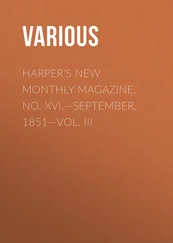Various - Harper's New Monthly Magazine, No. XXVI, July 1852, Vol. V
Здесь есть возможность читать онлайн «Various - Harper's New Monthly Magazine, No. XXVI, July 1852, Vol. V» — ознакомительный отрывок электронной книги совершенно бесплатно, а после прочтения отрывка купить полную версию. В некоторых случаях можно слушать аудио, скачать через торрент в формате fb2 и присутствует краткое содержание. Издательство: Иностранный паблик, Жанр: periodic, foreign_edu, на английском языке. Описание произведения, (предисловие) а так же отзывы посетителей доступны на портале библиотеки ЛибКат.
- Название:Harper's New Monthly Magazine, No. XXVI, July 1852, Vol. V
- Автор:
- Издательство:Иностранный паблик
- Жанр:
- Год:неизвестен
- ISBN:нет данных
- Рейтинг книги:4 / 5. Голосов: 1
-
Избранное:Добавить в избранное
- Отзывы:
-
Ваша оценка:
- 80
- 1
- 2
- 3
- 4
- 5
Harper's New Monthly Magazine, No. XXVI, July 1852, Vol. V: краткое содержание, описание и аннотация
Предлагаем к чтению аннотацию, описание, краткое содержание или предисловие (зависит от того, что написал сам автор книги «Harper's New Monthly Magazine, No. XXVI, July 1852, Vol. V»). Если вы не нашли необходимую информацию о книге — напишите в комментариях, мы постараемся отыскать её.
Harper's New Monthly Magazine, No. XXVI, July 1852, Vol. V — читать онлайн ознакомительный отрывок
Ниже представлен текст книги, разбитый по страницам. Система сохранения места последней прочитанной страницы, позволяет с удобством читать онлайн бесплатно книгу «Harper's New Monthly Magazine, No. XXVI, July 1852, Vol. V», без необходимости каждый раз заново искать на чём Вы остановились. Поставьте закладку, и сможете в любой момент перейти на страницу, на которой закончили чтение.
Интервал:
Закладка:
Nothing can be more admirably planned, or more completely and precisely executed than the system of accounts kept at the offices, by which not only every pecuniary transaction, but also, as would seem, almost every mechanical operation or act that takes place throughout the establishment is made a matter of record. Thus every thing is checked and regulated. No piece, large or small, can be lost from among its hundreds of fellows without being missed somewhere in some column of figures – and the whole history of every workman's doings, and of every piece of work done, is to be found recorded. Ask the master-armorer any questions whatever about the workings of the establishment, whether relating to the minutest detail, or to most comprehensive and general results, and he takes down a book and shows you the answer in some column or table.
After all, however, this neatness, precision, and elegance in the appearance and in the daily workings of an establishment like this, though very agreeable to the eye of the observer, constitute a test of only secondary importance in respect to the actual character of the administration that governs it. To judge properly on this point, the thing to be looked at is the actual and substantial results that are obtained. The manufacture of muskets is the great function of the Armory, and not the exhibition of beautiful workshops, and curious processes in mechanics for the entertainment of visitors. When we inquire, however, into the present arrangement of this establishment, in this point of view, the conclusion seems to be still more decidedly in its favor than in the other. The cost of manufacturing each musket immediately before the commencement of the term of the present commander was about seventeen dollars and a half. During the past year it has been eight dollars and three quarters, and yet the men are paid better wages now per day, or, rather, they are paid at such rates for their work, that they can earn more now per day, than then. The saving has thus not been at all made from the pay of the workmen, but wholly from the introduction of new and improved modes of manufacture, better machines, a superior degree of order, system, and economy in every department, and other similar causes. How far the improvements which have thus been made are due to the intrinsic qualities of military government, and how far to the personal efficiency of the officer in this case intrusted with the administration of it, it might be somewhat difficult to decide.
In fact, when judging of the advancement made during a period of ten years, in an establishment of this kind, at the present age of the world, some considerable portion of the improvement that is manifested is due, doubtless, to the operation of those causes which are producing a general progress in all the arts and functions of social life. The tendency of every thing is onward. Every where, and for all purposes, machinery is improving, materials are more and more easily procured, new facilities are discovered and new inventions are made, the results of which inure to the common benefit of all mankind. It is only so far as an establishment like the Armory advances at a more rapid rate than that of the general progress of the age, that any special credit is due to those who administer its affairs. It always seems, however, to strangers visiting the Armory and observing its condition, that these general causes will account for but a small portion of the results which have been attained in the management of it, during the past ten years.
CONCLUSION
As was stated at the commencement of the article, it is only a small part of the hundreds of thousands of muskets manufactured, that are destined ever to be used. Some portion of the whole number are served out to the army, and are employed in Indian warfare, others are destined to arm garrisons in various fortresses and military posts, where they are never called to any other service than to figure in peaceful drillings and parades. Far the greater portion, however, are sent away to various parts of the country, to be stored in the national arsenals, where they lie, and are to lie, as we hope, forever, undisturbed, in the midst of scenes of rural beauty and continued peace. The flowers bloom and the birds sing unmolested around the silent and solitary depositories, where these terrible instruments of carnage and destruction unconsciously and forever repose.
NAPOLEON BONAPARTE. 1 1 Entered, according to Act of Congress, in the year 1852, by Harper and Brothers, in the Clerk's Office of the District Court of the Southern District of New York.
It was the first great object of Napoleon, immediately upon his accession to power, to reconcile France with Europe, and to make peace with all the world. France was weary of war. She needed repose, to recover from the turmoil of revolution. Napoleon, conscious of the necessities of France, was consecrating Herculean energies for the promotion of peace. The Directory, by oppressive acts, had excited the indignation of the United States. Napoleon, by a course of conciliation, immediately removed that hostility, and, but a short time before the treaty of Luneville, ratified a treaty of amity between France and the United States. The signature of this treaty was celebrated with great rejoicings at the beautiful country seat which Joseph, who in consequence of his marriage was richer than his brother, had purchased at Morfontaine. Napoleon, accompanied by a brilliant party, met the American commissioners there. The most elegant decorations within the mansion and in the gardens, represented France and America joined in friendly union. Napoleon presented the following toast: "The memory of the French and the Americans who died on the field of battle for the independence of the New World." Lebrun, the Second Consul, proposed, "The union of America with the Northern powers, to enforce respect for the liberty of the seas." Cambaceres gave for the third toast, "The successor of Washington." Thus did Napoleon endeavor to secure the friendship of the United States.
About this time Pope Pius VI. died, and the Cardinals met to choose his successor. The respect with which Napoleon had treated the Pope, and his kindness to the emigrant priests, during the first Italian campaign, presented so strong a contrast with the violence enjoined by the Directory, as to produce a profound impression upon the minds of the Pope and the Cardinals.
The Bishop of Imola was universally esteemed for his extensive learning, his gentle virtues, and his firm probity. Upon the occasion of the union of his diocese with the Cisalpine Republic, he preached a very celebrated sermon, in which he spoke of the conduct of the French in terms highly gratifying to the young conqueror. The power of Napoleon was now in the ascendant. It was deemed important to conciliate his favor. "It is from France," said Cardinal Gonsalvi, "that persecutions have come upon us for the last ten years. It is from France, perhaps, that we shall derive aid and consolation for the future. A very extraordinary young man, one very difficult as yet to judge, holds dominion there at the present day. His influence will soon be paramount in Italy. Remember that he protected the priests in 1797. He has recently conferred funeral honors upon Pius VI." These were words of deep foresight. They were appreciated by the sagacious Cardinals. To conciliate the favor of Napoleon, the Bishop of Imola was elected to the pontifical chair as Pope Pius VII.
Naples had been most perfidious in its hostility to France. The Queen of Naples was a proud daughter of Maria Theresa, and sister of the Emperor of Austria and of the unfortunate Marie Antoinette. She surely must not be too severely condemned for execrating a revolution which had consigned her sister to the dungeon and to the guillotine. Naples, deprived of Austrian aid, was powerless. She trembled under apprehension of the vengeance of Napoleon. The King of Austria could no longer render his sister any assistance. She adopted the decisive and romantic expedient of proceeding in person, notwithstanding the rigor of the approaching winter, to St. Petersburg, to implore the intercession of the Emperor Paul. The eccentric monarch, flattered by the supplication of the beautiful queen, immediately espoused her cause, and dispatched a messenger to Napoleon, soliciting him, as a personal favor, to deal gently with Naples. The occurrence was, of course, a triumph and a gratification to Napoleon. Most promptly and courteously he responded to the appeal. It was indeed his constant study at this time, to arrest the further progress of the revolution, to establish the interests of France upon a basis of order and of law, and to conciliate the surrounding monarchies, by proving to them that he had no disposition to revolutionize their realms. A word from him would have driven the King and Queen of Naples into exile, and would have converted their kingdom into a republic. But Napoleon refused to utter that word, and sustained the King of Naples upon his throne.
Читать дальшеИнтервал:
Закладка:
Похожие книги на «Harper's New Monthly Magazine, No. XXVI, July 1852, Vol. V»
Представляем Вашему вниманию похожие книги на «Harper's New Monthly Magazine, No. XXVI, July 1852, Vol. V» списком для выбора. Мы отобрали схожую по названию и смыслу литературу в надежде предоставить читателям больше вариантов отыскать новые, интересные, ещё непрочитанные произведения.
Обсуждение, отзывы о книге «Harper's New Monthly Magazine, No. XXVI, July 1852, Vol. V» и просто собственные мнения читателей. Оставьте ваши комментарии, напишите, что Вы думаете о произведении, его смысле или главных героях. Укажите что конкретно понравилось, а что нет, и почему Вы так считаете.












